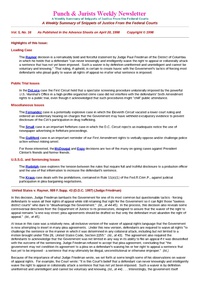The central issue in this explosive appeal was whether the Government had withheld critical material information of which it was aware that would "point the finger" at CIA participation in the charged drug trafficking activities. Here, a convicted former Miami-Dade police officer challenged his conviction for conspiracy to import …
The defendant in this case was a former INS agent who was convicted of bribery and the sale of false "green cards." One of his challenges to his sentence was that the district court had erred by increasing his offense level by two levels under U.S.S.G. § 2C1.1(b)(1) based …
Joining the First, Fifth, Seventh and Ninth Circuits, the Eleventh Circuit held that the question of materiality under 26 USC § 7206(1) is for the jury - and not for the trial judge - although it also held that the trial court's error was harmless.
The federal tax …
The defendant in this case was a former INS agent who was convicted of bribery and the sale of false "green cards." One of his challenges to his sentence was that the district court had erred as a matter of law by failing to group together for sentencing purposes …
Here the Court essentially affirmed its earlier decision, reported at 128 F.3d 974, in which it established a nearly impossible burden of proof for proving that a search at an airport was racially motivated.
At pages 1406-1409 Court discusses at length the purposes and scope of § 2H1.1.
Case held that First Amendment protects speech directed at police officers unless it amounts to fighting words.
QUOTE OF THE WEEK - Why our Founders felt that open and public trials were so essential.
"The traditional Anglo-American distrust for secret trials has been variously ascribed to the notorious use of this practice by the Spanish Inquisition, to the excesses of the English Court of Star Chamber, …
Here the Court held that the district court had not abused its discretion by enpaneling an anonymous jury, although it noted that the use of such procedures "is an extraordinary protective device" that should be used sparingly.
The Court wrote: "Although the empanelment of an anonymous jury should …
This case is noted because of its rather laborious discussion of the mandates of Rule 11(e)(1) of the Fed.R.Crim.P. that the court "shall not participate" in any plea negotiation discussions. The case had a long and convoluted history which started with an eight year old conviction for drug crimes. …
This case is noted because of its rather laborious discussion of the mandates of Rule 11(e)(1) of the Fed.R.Crim.P. that the court "shall not participate" in any plea negotiation discussions. The case had a long and convoluted history which started with an eight year old conviction for drug crimes. …
United States v. McDougal, 137 F.3d 547 (8th Cir. 1998) (Judge Gibson)
United States v. Espy, 989 F.Supp. 17 (D.D.C. 17 1997) (Judge Urbina)
For those interested in following the political machinations and legal battles involving President Clinton's friends in office, this week's cases include two of those ongoing …
The principal issue raised on this appeal was a claim that the defendants' rights under the Sixth Amendment had been violated through the implementation of spectator screening procedures that "chilled" their right to a public trial. The defendants, who the Government claimed were members of various crime organizations, were …
Here the Court held that the provisions of 18 U.S.C. § 3051 (entitled Admissibility of Confessions), rather than the standards laid down in Miranda v. Arizona, 384 U.S. 436 (1996), govern the admissibility of confessions in Federal courts.
United States v. McDougal, 137 F.3d 547 (8th Cir. 1998) (Judge Gibson)
United States v. Espy, 989 F.Supp. 17 (D.D.C. 17 1997) (Judge Urbina)
For those interested in following the political machinations and legal battles involving President Clinton's friends in office, this week's cases include two of those ongoing …
This is a significant and well-written decision in which the Court held that waiver of right to appeal a sentence yet to be imposed can never be knowing and voluntary; and in which the Court criticized the "one way street" of appeal wavers.
n this decision, Judge Friedman …
Case held that publication of notice in USA Today is not adequate notice of forfeiture proceeding.
This forfeiture case is a rarity because it reversed an administrative forfeiture due to the failure of the DEA to give proper notice of the forfeiture proceedings. Of course, the amount of …
This civil rights suit for damages under 42 U.S.C. § 1983 is noted because of its discussion of a citizen's First Amendment rights to resist arrest. The appellant in this case was arrested on a misdemeanor charge of obstructing the police. During his brief encounter with the police he …
Case held that publication of notice in USA Today is not adequate notice of forfeiture proceeding.
